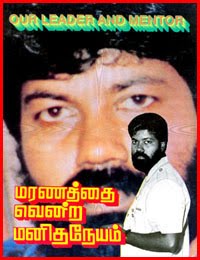FIGHTER FOR A CAUSE
S.D.Muni, Professor, South Asia Studies, Jawaharlal Nehru University, New Delhi
It was a hot, sultry evening in June. When I answered the door bell, I saw Ketheeswaran and Shanthan of the EPRLF standing at the threshold. Behind them was a tall, well built young man whose face reflected self-confidence, mixed with a deep-down concern. Yes, he was Comrade Pathmanabha or comrade. Nabha, as he was affectionately called by his friends and associates the leader and builder of EPRLF. I took a few seconds to recognise him because he had shaved off his beard that used to give him a robust revolutionary look. Despite his decision to shave-off his beard, clearly an attempt to conceal his identity, he was more than casual in his sense of personal security. This became evident when he was assassinated in Madras only three days after this brief meeting I had with him in my house.
Why was the LTTE gunning for him? The clash was certainly more than that of personality or power ambitions. It centered mainly on two points related to the approach towards the Tamil question and its resolution in the Sri Lankan context. One was regarding the Lilt’s insistence on a political order that allowed no room for dissent or pluralism. This was not acceptable to comrade. Nabha and his EPRLF. For they stood for social justice and equality for Tamil community in relation to the Sinhalese, on the one hand, and to the deprived sections within the Tamil society which had always been hierarchical ridden with caste and status differentiation.
While both LTTE and the EPRLF agreed to on the necessity of armed struggle for liberating the Tamils and undoing their discrimination in the hands of Sinhala chauvinism, they had divergent perspectives on the organisation of Tamil polity and society. The LTTE had no respect for democratic order and, therefore, did not hesitate in taking recourse to arms in silencing any dissent against their pursuit for hegemony. The EPRLF looked for a just, plural and democratic socio-political order for the Tamils. This explains why comrade. Nabha though reluctantly, was willing to work with the LTTE within the framework of a democratic structure. Not only was the LTTE invited to contest provincial council elections, but even later, the EPRLF was willing to accomodate the LTTE representatives into the North-East Provincial Council, so as to promote the overall cause of the Tamils.
A critical difference of opinion between comrade. Nabha and his EPRLF, on one hand, and the LTTE, on the other, lay in their respective approaches towards India in securing help for resolving the Tamil issue. The LTTE sought to use India in a manner that was to wider Tamil interests, as well as India’s own security concerns. Its primary motive was the pursuit for absolute hegemony. That is why the LTTE did not want to give the India-Sri Lanka Agreement of 1987 a chance and even went to the extent of taking to arms against the IPKF. The LTTE also did not hesitate to join hands with the Sri Lankan Government purely for technical reasons of pushing out the IPKF and humiliating India as a consequence. The LTTE no doubt achieved its objective, but only at the cost of larger Tamil interests, as the recent developments in Sri Lanka clearly reveal. comrade. Nabha, on the other hand, followed a far more realistic and mature approach. He too had been trained abroad and exposed to various internationalist perspectives. But he realised that it was in India alone that the Tamils of Sri Lanka could find a committed well-wisher. In addition, his own anti-Imperialist outlook converged with that of India’s own anti-Imperialist credentials. That is why comrade. Nabha accepted the Indo-Sri Lanka Agreement of July 1987, not withstanding his reservations on some of its key aspects and also notwithstanding his understanding that the Colombo regime could not be trusted. His commitment to India’s role in the search for a long-lasting solution to Tamil question in Sri
Lanka was so deep that he willingly suffered the humiliation of having to leave his soil and live in exile as a refugee in India .
It is indeed unfortunate that the political change in India in 1989 allowed the decision- makers in Delhi to ignore the vitality and significance of the alliance forged by comradc. Nabha with India. It is a sad reflection on India’s political insensitivity that comrade. Nabha was brutaly killed on Indian soil and in a State ruled by Tamils.
The on-going breakdown of all civilisational norms in the North and East of Sri Lanka arising out of the LTTE- Clombo war, should now lead Delhi and Colombo of recognising the need for a balanced and far-sighted approach adopted by comrade. Nabha and his EPRLF New Delhi must start according dignity and respect to the EPRLF cadres staying in India India must also impress upon Colombo the need to take the help of the saner forces amongs the Sri Lankan Tamils, such as the EPRLF, no in its so-called drive for eliminating the LTTE but for impressing moderation on the LTTE and for finding a respectable, just and viable solution to the Tamil question. This would be the best tribute that can be paid to comrade. Nabha who lived, struggled and eventually sacrificed his life for the rights and respect of the Tamils, particularly the deprived and down-trodden among them.

